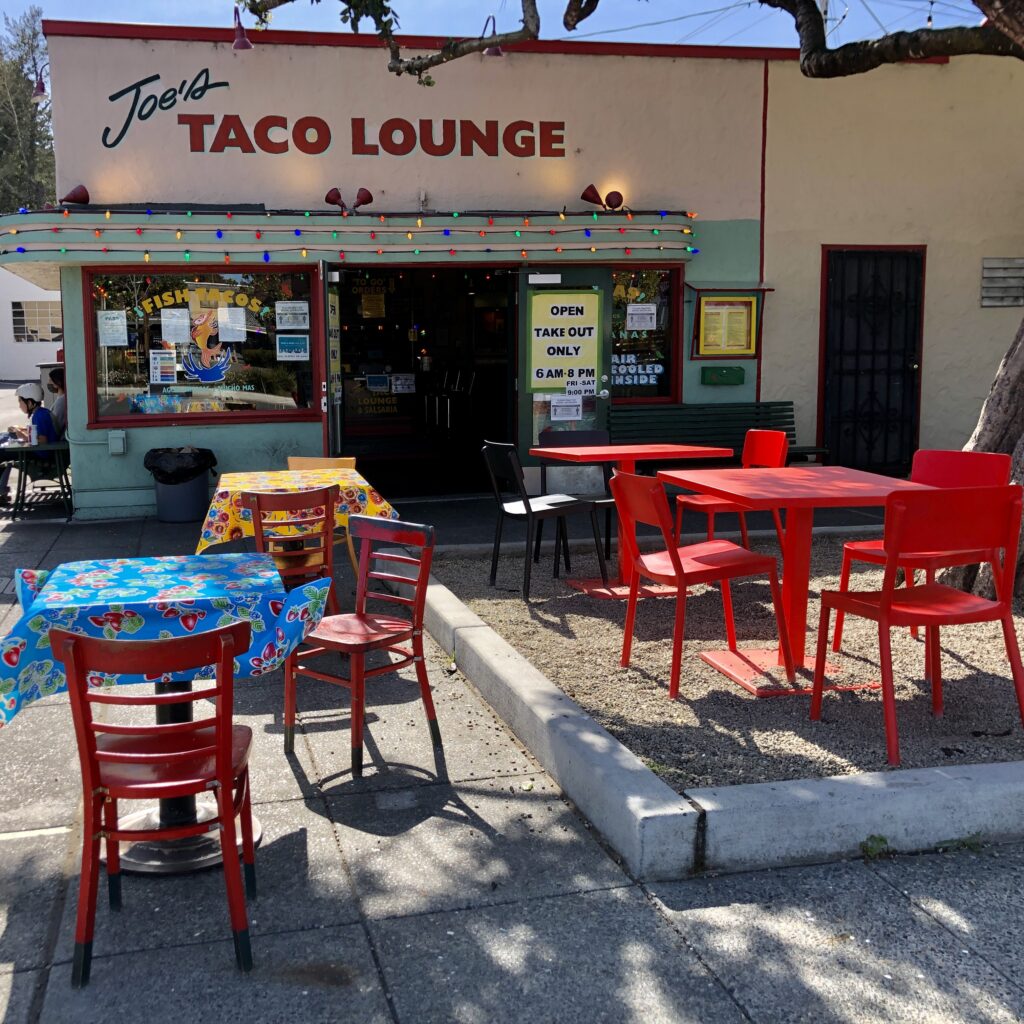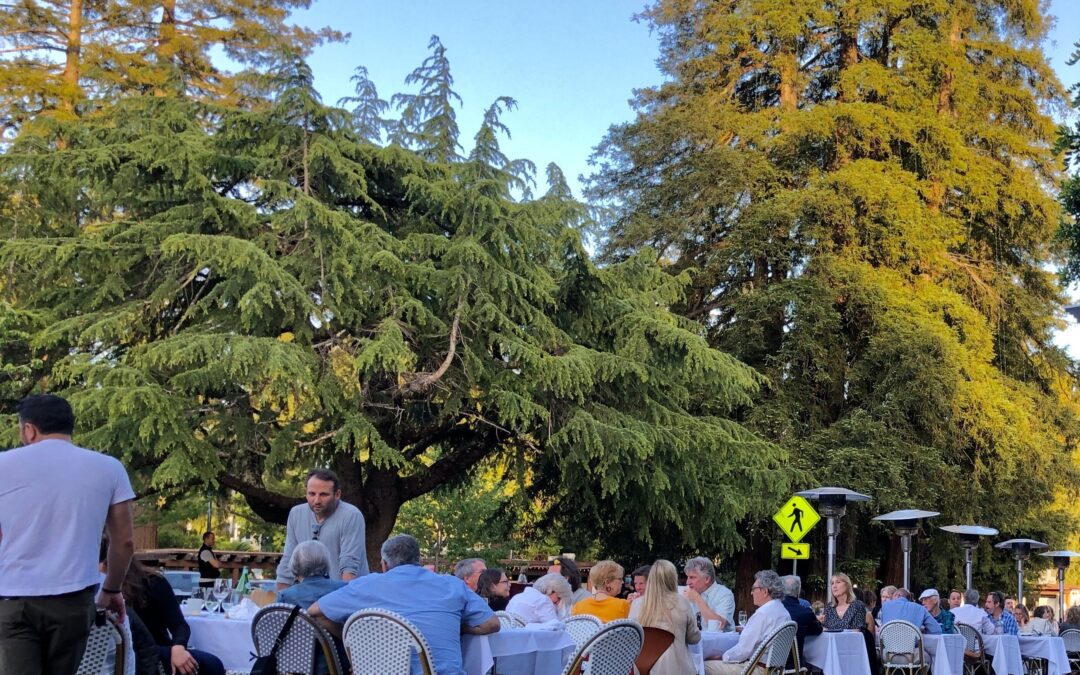Some councilmembers indicate an openness to future changes

The pandemic has left no individual, business or entity untouched, and the scars of loss permeate through all of us. But it has also delivered luminous moments of joy, like the first time we saw a loved one in person after being unable to do so for a long stretch, or ducked into the reinvigorated Sweetwater Music Hall for our first concert in ages.
When Mill Valley and County of Marin officials created an exciting framework for outdoor business that blossomed all over town, it brought an infusion of vitality. Restaurants embraced the thrill of outdoor dining. Fitness facilities repurposed any outdoor space they could to host workouts. Hair and nail salons pampered their clients in the open air.
Monday night’s Mill Valley City Council meeting was a reminder that the COVID-19 crisis has regularly followed those aforementioned moments of joy with a swift reality check.
The massive popularity of outdoor use has also been a lightning rod of sorts as governments across the Bay Area and beyond have struggled to find the right balance of regulation and creative experimentation.
As the San Francisco Chronicle reported in December, the City of San Francisco made parklets permanent but added so many rules that many restaurants planned to tear them down. Three months later, city officials made a u-turn, passing an ordinance to delay issuing fines for non-compliant parklet structures under its permanent Shared Spaces parklet program until April 1, 2023.
Even some of the most successful outdoor dining and parklet programs in Marin, like San Anselmo, has faced pushback from retail shop owners who believed too much had been granted to outdoor use. Others, like Fairfax, have extended its parklet program with some refined regulations that seek to address safety concerns and better sightlines.
Monday night was Mill Valley’s turn to wrestle with right-sizing our experiment with outdoor dining, parklets and other uses, with the current ordinance ordinance set to expire in two months.
While the city received more than 230 comments from residents in support of outdoor dining this week – not everyone has enjoyed the al fresco everything approach. Some worry about parking or have seen it as too much change.
With that as the backdrop, city officials proposed, and the council approved:
- Another extension of the city’s urgency ordinance, and the outdoor business program it spawned, through October 31, 2022, for existing users of the program only, allowing time for the city to create a long-term outdoor business use program.
- A new, Seasonal Outdoor Business Program that requires the removal of all infrastructure–parklets, tents, etc., by October 31, 2022, and allows restaurants to apply to use up to two parking spaces during the months of June to October, beginning in 2023. Equator Coffees and Piazza D’Angelo are the city’s only two existing parklets. All businesses interested in participating in the new program would need to reapply. The move towards a seasonally limited program would be the first of its kind in Marin.
- Heaters and umbrellas would be allowed, but roofs, walls or tents or permanent structures of any kind would not when the new program begins in June 2023. Structures must sit on a leveling platform and be easy to remove and create minimal visual impact.
- The city’s program would not be available to salons, gyms or any other non-restaurant business unless limited to merchandise displays.
- As of Monday evening, there was no clear pathway for restaurants located on private space – including Bungalow 44, Tamalpie and The Cantina – to use more private parking spaces than those allowed under its current conditional use permit. As a practical matter, businesses could only create outdoor dining by moving onto city streets.
- City officials reminded business owners that the City’s existing Outdoor Dining Areas and Outdoor Merchandise Displays program remains in place, giving businesses like Joe’s Taco Lounge and The 2am Club the ability to apply for the use of the public right-of-way immediately adjacent to the business frontage, but not the use or obstruction of parking areas and driveways. This program is distinct from the Outdoor Business Program.
- New and existing fees, waived during the COVID-19 crisis, would be instituted.
Deliberations on the 2023 program’s seasonality proved unwieldy as some councilmembers expressed openness to expanding the seasonal dates and others wondered if it was premature to make any explicit changes to the municipal code.
“This is something the community loves and it has made Mill Valley better than it has been in the past,” Councilmember Urban Carmel said, referring to the proposed seasonal approach. “This can grow over time to become a bigger program.”
“I could see a March to October program,” Councilmember Stephen Burke said.
“We are deliberating a program, not a continuing experiment,’ said McCauley, who noted his preference for a seasonal program from mid-June to mid-August. “My sense is that we give clear guidance that we wrap this thing up so we don’t hear from the Chamber every three weeks.”
“You guys will make your own decisions in the future in terms of if you want to expand this,” McCauley added. “I vote for a code change that is decisive and finished.”
Before the council voted to approve a seasonal program, City Manager Alan Piombo informed the council that “in order to make zoning changes, the Planning Commission would need to review those changes prior to them coming back to council for adoption. But there would be no open or ongoing deliberation over what the program would look like.”
“We can’t override our own process,” Councilmember Sashi McEntee said.
Some residents held out hope for a future change of heart.
“This is an opportunity for Mill Valley to pivot from a sleepy town to a vibrant town,” Cascade Canyon resident Payton Stiewe said. “We see other parts of the world that have this and this sort of seems silly that we’d have to come inside.”
“Five months is definitely too short, because we don’t know what’s going to happen with Covid,” longtime local resident and EO Products co-founder Susan Griffin Black said. “The playing field is level as long as we do it for everyone.”


